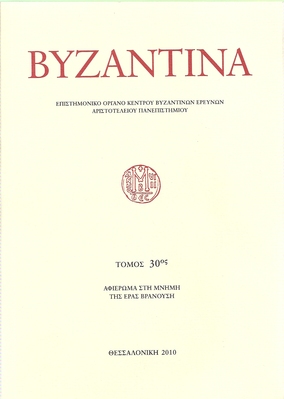Οι πηγές του περιεχομένου και της χρήσης του όρου επίνοια στο κατα Ευνομίου I του Βασιλείου Καισαρείας : Στωϊκοί και Πλωτίνος
Part of : Βυζαντινά : επιστημονικόν όργανον Κέντρου Βυζαντινών Ερευνών Φιλοσοφικής Σχολής Αριστοτελείου Πανεπιστημίου ; Vol.20, No.1, 1999, pages 7-42
Issue:
Pages:
7-42
Parallel Title:
The sources of content and use of επίνοια in Basil of Caesarea' s contra eunomium I : stoicism and Plotinus
Author:
Abstract:
It is commonplace that Basil of Caesarea’s theory of επίνοια as an epistemologically valid process of production of notions-names for the various aspects of the created beings and God (Contra Eunomium 1,6-8) is of Stoic background. This statement, however, has as yet remained rather unqualified.A detailed examination of the Contra Eunomium 1,6-8 throws light on the actual kind and degree of Basil’s dependence on Stoicism. In fact, Basil’s views do not imply any original philosophical conception at all. First, as regards the notion of επίνοια itself, Basil adopts its Stoic meaning as the noetic distinction between the various (past, present or future) aspects of beings. Secondly, drawing again upon Stoicism, he does not think of all names as outcomes of the mental process of επίνοια; he also accepts the existence of the so-called κοιναί εννοιαι, which precede in respect of time the process of επίνοια, being, so to say, its prima materia, and whose formation is exclusively due to immediate sense-perception and φαντασία without any intervention of the ratio. His analysis, however, proves very useful in that it highlights particular terms of Stoic epistemology, especially επιλο- γισμός and αναλογισμός. As a matter of fact the above-mentioned passage should probably used as a major source of Stoic epistemology.Basil was not original even in his theological use of the Stoic notion of επίνοια. Apart from Origen’s well-known description of the various names of Christ as επίνοιαι, which was as yet unanimously regarded as Basil’s source of inspiration, Eusebius of Caesarea in his Demonstratio Evangelica (IV,15), written about 313, had explicitly ascribed to the notion of επίνοια not only the various names of Christ but also the various names of God.Yet interestingly enough it seems that the text underlying the Contra Eunomium 1,6-8 is in fact the Enneade VI, 2,3-4. There Plotinus uses the notion of επίνοια in order to reconcile the unity and simplicity of the Second One (Νους - Intellect) with the multiplicity of its derivative beings and their names (see esp. VI, 2,4,21-28). That the sixth Ennead was Basil’s source is further corroborated by the identity of Basil’s and Plotinus’ elucidating example. Both of them (Contra Eunomium I, 6,25-29, ed. B. Sesboüé, G.-M. de Durand & L. Doutreleau, Basile de Césarée, Contre Eunome, suivi de Eunome, Apologie. Introduction, traduction et notes, tome I [«Sources chrétiennes», No 299], Paris 1982: 184’ Enneade VI, 2,4,1-20) compare the simultaneous unity and multiplicity of the Second One or God respectively to the simultaneous unity and multiplicity of the material bodies, each of which, albeit one as a being, can be properly divided aspectually (i.e. by human reason) into many things —e.g. substrate, quantity, quality, shape etc.This striking similarity has two implications, i) Basil’s conception of επίνοια as a valid process of theonymy is borrowed from Plotinus’ treatment of the problem «εν - πολλά» in the context of the latter’s task of reconciling the simplicity of the Second One (Νους - Intellect) with the multiplicity of its derivative beings, ii) Accordingly, it is highly likely that Basil had read Plotinus’ Enneade.
Subject (LC):




